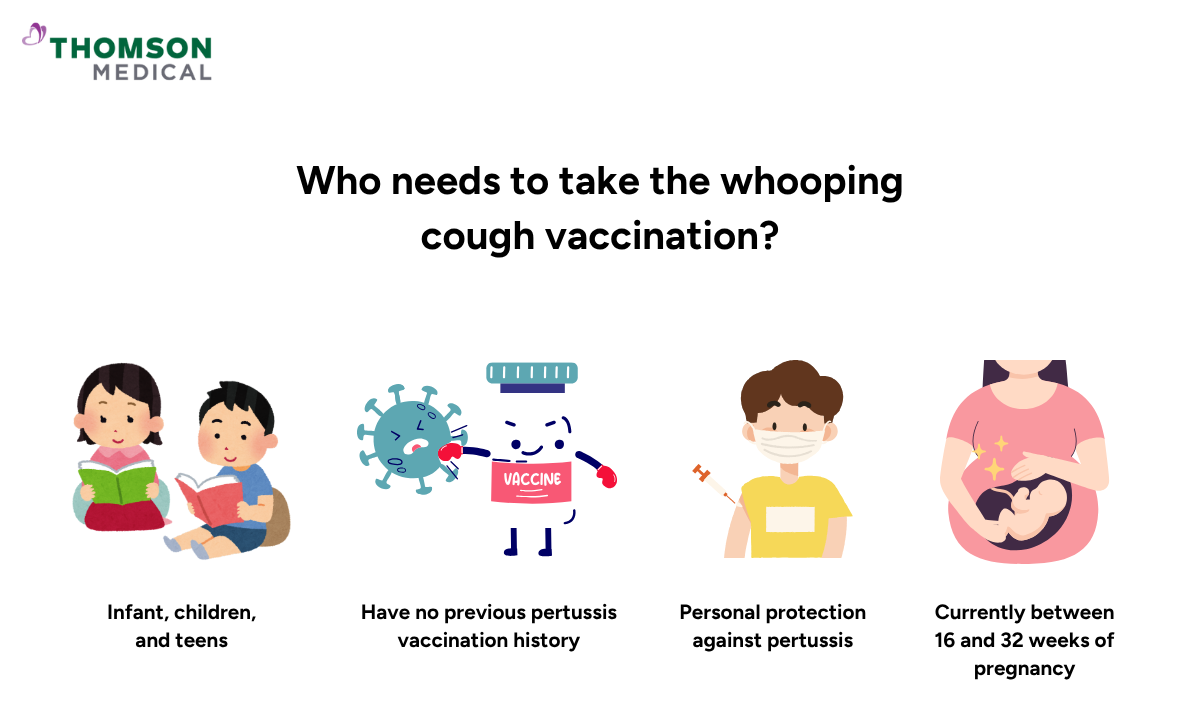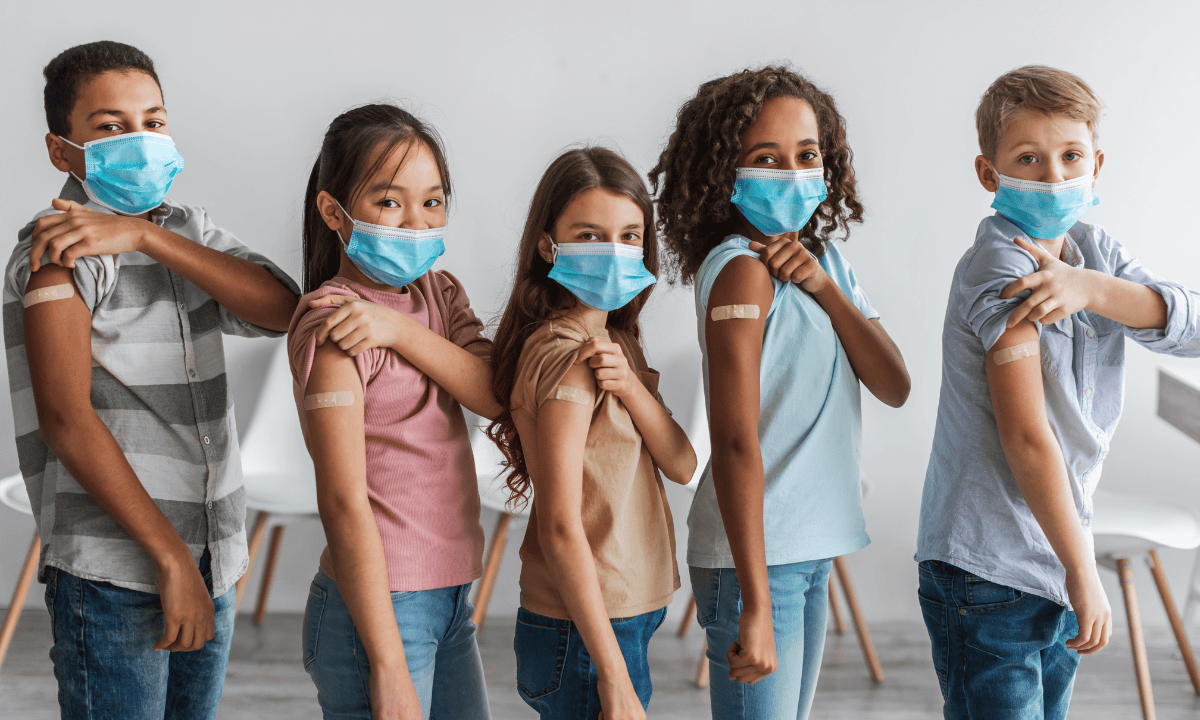Whooping cough (pertussis) continues to be a significant health concern, especially for infants and young children. Being aware of vaccination options and schedules is key to protecting your family against this highly contagious respiratory infection.
Whooping cough vaccination in Singapore

In Singapore, whooping cough vaccines are part of the national vaccination programme, which covers everyone from children to adults. For children, the National Childhood Immunisation Schedule (NCIS) is mandatory to protect them from the risk of contracting pertussis and is also necessary for school enrolment.
However, it is not only children who are vaccinated, as Singaporeans over the age of 18 can also receive the whooping cough vaccine through the National Adult Immunisation Schedule (NAIS). Although these vaccines are not mandatory, it’s recommended if you fit any of the following criteria:
Want personal protection against pertussis
Wish to protect vulnerable family members with medical conditions
Have no previous vaccination history
Received your last whooping cough vaccination more than 10 years ago
Additionally, if you are currently between 16 and 32 weeks into your pregnancy, a vaccination is recommended regardless of when your last whooping cough vaccination was. These vaccinations help to protect your baby from the infection.
The national vaccination programme aims to achieve herd immunity and prevent the spread of this infectious disease. This protection is vital because whooping cough starts with mild, cold-like symptoms, which can make people unaware that they are infected at first.
Without vaccination, adults or teenagers may spread whooping coughs during the early stages of infection without realising it. If children or infants contract the disease, it can lead to severe complications, including pneumonia and seizures.
Visit the Health Hub website for more information about the NCIS and NAIS vaccination programmes. For consultation with a doctor about the whooping cough vaccination, schedule an appointment with Thomson Medical.
How do whooping cough vaccines work?
The whooping cough vaccine stimulates your immune system to recognise and fight the Bordetella pertussis bacterium. If you are later exposed to the bacteria, your body can quickly fight them off, reducing the risk of infection and the severity of symptoms.
There are two types of this vaccine, the Tdap and DTaP vaccines. Both help prevent diphtheria (a bacterial infection that can block the airway and cause breathing difficulties), tetanus (an infection that causes painful muscle stiffness and spasms) and pertussis.
DTaP is used to protect children under the age of seven, while Tdap vaccines, such as Boostrix, are "booster" shots to protect older children, teens, and adults.
Although the whooping cough vaccine is effective at preventing this respiratory disease, it does not guarantee 100% protection. Its effectiveness can decline over time, especially in adults and adolescents. That's why booster doses (Tdap) are essential for maintaining immunity and protecting vulnerable people around you.
Who is the whooping cough vaccine recommended for?
The whooping cough vaccine is the most effective way to reduce your risk of contracting this respiratory disease. Vaccination is especially important for protecting infants and young children, who are most vulnerable to severe illness.
A whooping cough vaccination is recommended for:
Infants and children:
The DTaP vaccine dose is given at 2, 4 and 6 months as part of the National Childhood Immunisation Schedule.
Two booster doses are then recommended, one DTaP dose at 18 months, followed by a Tdap booster pertussis vaccine at 10–11 years old.
Adults:
A Tdap booster is recommended, especially for those in contact with infants, children, or pregnant women.
All adults who have never received the Tdap vaccine
Pregnant women:
It is recommended for pregnant women to receive the Tdap vaccine during each pregnancy, preferably between 16 and 32 weeks of pregnancy, to protect both mother and newborn.
Healthcare workers:
Vaccination is recommended for those who work in healthcare settings, especially if you work in close contact with infants.
Anyone who missed a dose:
A catch-up vaccination is recommended for children, teenagers, or adults who have missed any scheduled doses.
Who should not receive the vaccine?
While the whooping cough vaccine is highly effective, there are certain situations in which it may not be advised:
Anyone who has experienced a severe allergic reaction (anaphylaxis) to a previous dose of a pertussis-containing vaccine or any of its components.
People who are currently experiencing flu-like symptoms, a high fever, or an infection.
Individuals with a history of severe reactions like seizures or brain disorders following previous doses of the pertussis vaccine.
Is there any preparation required before the vaccination?

Before getting your dose of vaccination, there is no special preparation you need to do. However, there are a few important things you should inform your healthcare provider of beforehand, which include:
Any allergy to pertussis vaccine or any ingredients in it
If you are pregnant, planning to become pregnant, or breastfeeding
All medications you are currently taking
Have had an adverse reaction to the previous dose of vaccine
Currently not feeling well and having a fever
Any history of bleeding disorders
During your vaccination consultation, feel free to ask your doctor any questions about the process or what to expect.
During the vaccination
The whooping cough vaccine (DTaP/Tdap) is administered as a single injection into the upper arm muscle. It can be given alone or with other vaccines (e.g., hepatitis B, Hib, polio, or varicella).
The vaccination itself takes only a few seconds, but you will then need to wait 20–30 minutes to be monitored for any allergic reactions.
Whooping cough vaccine cost in Singapore
In Singapore, the whooping cough vaccine (DTaP or Tdap) is available at public and private hospitals, polyclinics, GP clinics, and vaccination clinics. Prices for a single dose of the pertussis vaccine can start at SGD 58 at private clinics, though costs may vary depending on which clinic you choose.
Eligible Singapore Citizens can receive subsidies of up to 75% at polyclinics or CHAS GP clinics, while Permanent Residents are eligible for up to a 25% subsidy. Additional subsidies are available for Pioneer Generation and Merdeka Generation seniors.
Singaporean citizens enrolled in Healthier SG may also receive fully subsidised (SGD 0) NAIS vaccinations at some clinics.
You can also use your MediSave (under the MediSave400 scheme) to pay for recommended vaccinations at public healthcare institutions, MediSave-accredited GPs, and private hospitals, up to an annual withdrawal limit of SGD 400 per account.
However, since prices and subsidy eligibility can vary by clinic and individual circumstances, it’s best to check with your healthcare provider before vaccination to confirm the exact fees and available payment options.
To find out more about fees and payment options, schedule an appointment with Thomson Medical. For further information about subsidies and Medisave coverage for the whooping cough vaccine, please refer to the Health Hub website.
Side effects of whooping cough
The whooping cough vaccine is generally safe and effective at preventing this respiratory disease. However, as with any other vaccines, mild side effects may occur, which indicate that your immune system is responding to the vaccine.
Most people experience no serious symptoms after pertussis vaccination, and any side effects usually go away on their own. Here are some common side effects of the pertussis vaccine, which include:
Pain, redness and swelling at the injection site
Crying, irritability, restlessness, sleepiness in children
Loss of appetite, diarrhoea, or vomiting
Mild fever
Body aches and fatigue
Reduced appetite
Headache
However, while rare, some people may experience serious reactions to pertussis vaccine that require immediate medical attention. If you experience any of the following symptoms, contact your doctor or seek emergency care:
Swollen face, eyes, lips, or tongue
Difficulty breathing
Itchy rashes all over the body
High fever
FAQ
Is the whooping cough vaccine really necessary?
Yes, the whooping cough vaccine is necessary because whooping cough is a serious and highly contagious disease. It can cause severe complications, especially in infants and young children, including pneumonia (lung infection), seizures, and even life-threatening conditions.
Vaccination is the best way to prevent this disease and protect both yourself and vulnerable people around you.
When is the whooping cough vaccine given?
The timing of the whooping cough vaccine varies depending on age and individual circumstances. Here’s how the schedule typically works for different groups:
- Infants and children:
- The vaccine is given as part of the DTaP series at 2, 4, and 6 months of age. Boosters are then administered at 18 months and again with a Tdap booster at age 11 or 12.
- Adults:
- To maintain your immunity status, adults should receive a Tdap booster every 10 years, especially if they are in close contact with infants.
- Pregnant women:
- If you are currently pregnant, it is recommended to receive a Tdap vaccine during each pregnancy, preferably between 16 and 32 weeks.
Is whooping cough lifetime immunity?
No, the pertussis vaccine does not provide lifelong immunity to whooping cough. The protection it provides decreases over time, particularly in adolescents and adults. This is why booster doses are necessary to maintain their protective effects.
What are five symptoms of whooping cough?
Whooping coughs, or pertussis, are characterised by symptoms that develop in stages and vary in severity. Here are five common symptoms to watch out for as the illness progresses:
- Cold-like symptoms:
- In the early stages, whooping cough often resembles a common cold, with symptoms such as a runny or stuffy nose, a mild cough, sneezing, and occasionally a mild fever.
- Severe coughing fits:
- As the disease advances, frequent and intense coughing fits develop. These fits can be rapid and uncontrollable, often lasting for weeks.
- "Whooping" sound:
- Patients may struggle to breathe after a coughing fit, especially in children, resulting in a high-pitched “whoop” sound.
- Vomiting after coughing:
- Coughing fits can also lead to vomiting, particularly after prolonged fits.
- Exhaustion or fatigue:
- Patients often feel tired or worn out after coughing fits.
When is it too late to have the whooping cough vaccine?
You can receive the whooping cough vaccine at any time. Even if you missed the recommended age for vaccination, you can still get it at your next healthcare appointment. Pregnant women can receive the vaccine up until delivery, but earlier in pregnancy (ideally between 16 and 32 weeks) provides the best protection for the baby.
Do antibiotics help a whooping cough?
Yes, antibiotics can help treat whooping cough, especially when administered early. Antibiotics can also help prevent the whooping cough infection from spreading to others. However, it may not alleviate symptoms if administered late in the disease's progression, although they are still necessary for limiting transmission.
This information serves as general guidance only and wasn't meant to be medical advice. To find out more about the whooping cough vaccination in Singapore and whether it is suitable for you, schedule an appointment with Thomson Medical.
